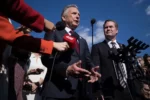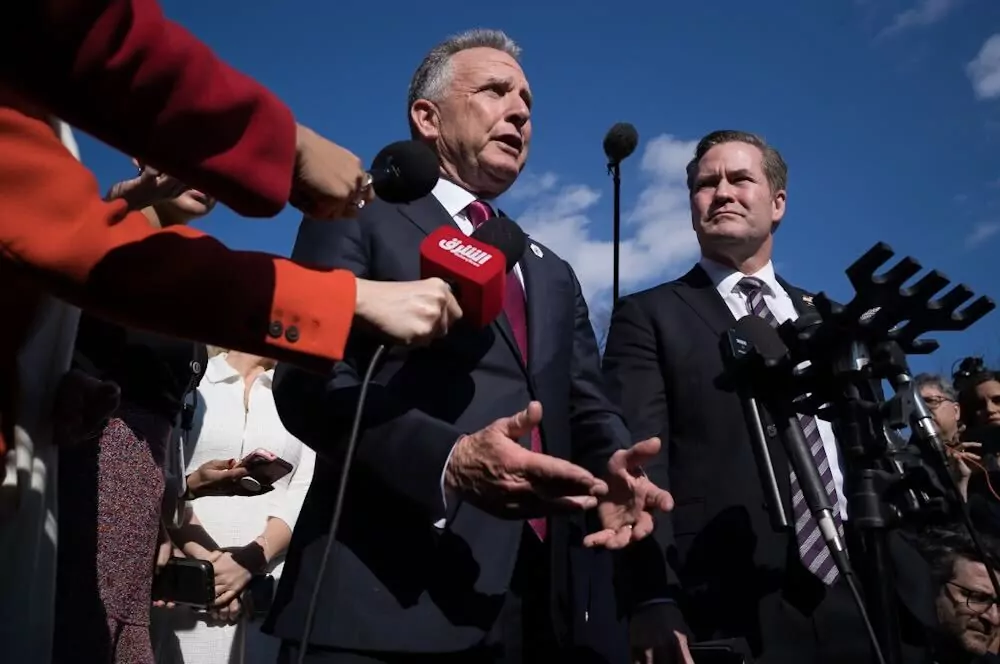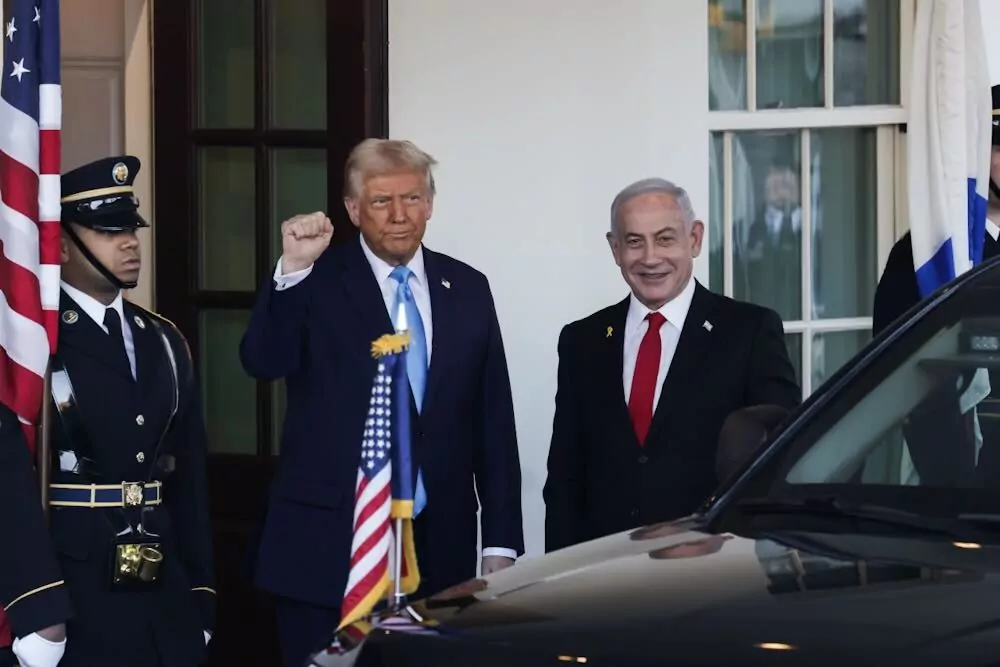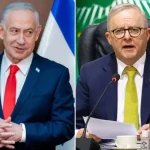
President Donald Trump said alongside Israeli Prime Minister Benjamin Netanyahu that the United States would “own” the Gaza Strip in the aftermath of the Israel-Hamas war.
“The U.S. will take over the Gaza Strip and do a job with it too. We’ll own it,” Trump announced at his first joint press conference with a foreign leader at the White House of his second term.
After the causality-heavy war that broke out after the Oct. 7 terrorist attack on Israel, Trump called Gaza a symbol of death and “destruction” and proposed that Palestinians be relocated to nearby Arab states despite protestations.
Trump didn’t provide details on how the U.S. might come to own the Hamas-controlled area and redevelop it into the “Riviera of the Middle East.” When asked whether he’d deploy U.S. troops to transform the 140-square-mile Palestinian territory, Trump said, “We’ll do what is necessary.”
While Trump officials had been referring to war-torn Gaza as a “demolition site,” Trump’s announcement of U.S. expansion into the Middle East was not telegraphed and comes after the 47th president also said he wants to take over the Panama Canal and Greenland for strategic defense and economic reasons.
Trump said he didn’t make the decision “lightly,” but he views U.S. “long-term ownership” as key to stability and peace in the Middle East, on top of allegedly improving the lives of the Palestinian people.
“They have never had a chance at life because the Gaza Strip has been a hell hole for people living there,” he claimed. “It’s been horrible. Hamas has made it so bad, so bad, so dangerous, so unfair to people.”
Steve Witkoff, Trump’s special envoy to the Middle East, and other top Trump administration officials made the case for resettling Palestinians in other Arab countries earlier in the day, following Trump’s suggestion last week that neighboring Egypt and Jordan offer shelter to the refugees throughout the rebuilding process.
However, leaders from Egypt, Jordan, the United Arab Emirates, Saudi Arabia, Qatar, and the Arab League released a statement condemning Trump’s proposed resettlement of Palestinians as forced “evictions” that they would not allow “in any form or under any circumstances or justifications.”
Netanyahu himself gave his blessing to Trump’s announcement, claiming that it would ensure “that Gaza never poses a threat to Israel.”
“President Trump is taking it to a much higher level. He sees a different future for that piece of land that has been the focus of so much terrorism, so many attacks against us, so many, so many trials and so many tribulations,” the Israeli prime minister stated. “He has a different idea, and I think it’s worth paying attention to this.”
Still, partisans on both sides of the aisle reacted negatively to Trump’s proposal, noting that a long-term occupation marks a significant escalation of America’s involvement in the war, on top of security and humanitarian aid the U.S. is already supplying to Israel and the Palestinian people, respectively.
One veteran GOP operative, granted anonymity to openly discuss the news, claimed that “any U.S. occupation of the Gaza Strip will be far worse than Afghanistan and Iraq.”
“This coming from the ‘anti-war president,’” that person continued. “What is Steve Bannon saying?”
Sen. Chris Murphy (D-CT) called the idea of a U.S. occupation “a bad, sick joke” and claimed that the president has “totally lost it.”
“A U.S. invasion of Gaza would lead to the slaughter of thousands of U.S. troops and decades of war in the Middle East,” he wrote on X.
The press conference announcement capped Netanyahu’s working visit at the White House Tuesday to discuss plans for ending the war in Gaza.
The war has seen significant death tolls on both sides, with Hamas killing more than 1,200 people in the Oct. 7, 2023, attacks and Palestinians seeing significantly more casualties and destruction, with some estimates putting the death toll north of 60,000. Witkoff has made multiple trips to Israel and Gaza since election night, and he has estimated that the cleanup and rebuilding effort will take 10 to 15 years, as opposed to the five years outlined in the existing ceasefire agreement.
Earlier, Trump and Netanyahu briefly spoke to reporters in the Oval Office following Netanyahu’s arrival. The president tripled down on remarks he’d made earlier in the day about resettling Palestinians in other Arab countries, while Netanyahu threw a blunt dig at former President Joe Biden, stating Trump deserves credit for brokering the January ceasefire deal.

“We are dealing with a lot of people, and we have steps to go yet, as you know, and maybe those steps go forward, and maybe they don’t,” Trump said of the ceasefire proceedings. “We have the right leader of Israel. He’s done a great job.”
“We’re going to try,” Netanyahu added. “That’s one of the things we’re talking about.”
Phase one of the ceasefire deal brokered by the Biden administration included the release of 33 Israeli hostages and more Palestinian prisoners, in addition to Israel withdrawing from most of Gaza and an increase in humanitarian aid, is poised to expire on Feb. 18. The second stage is supposed to include the release of younger Israeli male hostages and Israel agreeing to end the war.
The third phase would mark the end of the war, with bodies being exchanged, Israel withdrawing from Gaza entirely, and the reconstruction of the enclave starting.
Witkoff and national security adviser Mike Waltz spoke to reporters Tuesday afternoon before Netanyahu’s arrival, where they were adamant that ceasefire negotiations were weeks into the second phase.

“We’re in Day 17 of phase two,” Witkoff stated before leaving the door open to amending the time frame outlined in the agreement brokered by the Biden administration. Witkoff’s comments marked a departure from Trump’s previous comments taking credit for the ceasefire and crediting his dispatch of Witkoff to the Middle East following the 2024 election in speeding up negotiations between Israel and Hamas.
“Part of the problem is that it wasn’t such a wonderful agreement that was first signed that was not dictated by the Trump administration. We had nothing to do with it,” he continued.
“There’s a lot of opportunity in the region, and mostly there is real optimism,” Waltz added. “I think we’re on the precipice. We talked about the next round of the Abraham Accords. That’s the goal.”
Before the meeting, the White House referred to Gaza as a “demolition site,” predicting it would take more than a decade to reconstruct the enclave.
When pressed on Trump’s support of a two-state solution and his proposal to resettle Palestinians in Egypt and Jordan, the White House told the Washington Examiner that the president’s priority is ensuring the return of Hamas-held hostages and that the terrorist organization “cannot continue to govern and is out of power.”
“On the relocation, I think President Trump looks at the Gaza Strip and sees it as a demolition site, sees it as impractical for it to be rebuilt within three to five years, believes it will take at least 10 to 15, and thinks it’s inhumane to force people to live in an uninhabitable plot of land with unexploded ordnance and rubble,” a senior administration official said.
According to the official, Trump was also “looking for solutions for helping the people of Gaza have normal lives while the Gaza Strip is ultimately being rebuilt and is trying to look at this in a realistic way.”

Hours before Netanyahu’s arrival, a group of protesters, including former hostage Ilana Gritzewsky and Einav Zangauker, the mother of Matan Zangauker who remains in Hamas’s captivity, demonstrated outside the White House. The protesters called for the immediate release of the remaining hostages held by Hamas, chanting the names of the remaining hostages and calling on Trump to “bring them home now.”
Cheryl Silver, a Washington, D.C., resident who attended the protest, told the Washington Examiner that she believes Trump “is determined to have a peace in Gaza” but said she “personally [didn’t] know” if Netanyahu could be trusted to continue moving toward peace.
Michael Jungreis, who traveled from Philadelphia to attend Tuesday’s event, gave a more dour assessment of Netanyahu’s role in ending the war.
“Netanyahu is basically selling the lives of Israelis in order to keep his coalition alive,” he said in an interview. “It’s an unprecedented crime in Israeli history, and it’s all eventually to prevent his criminal trial.”
CLICK HERE TO READ MORE FROM THE WASHINGTON EXAMINER
Ahead of the press conference, Trump sat down with Netanyahu on Tuesday afternoon before the two leaders participated in an expanded bilateral meeting and were to end the day with a White House dinner.
The two men have a strong relationship galvanized by decisions Trump made during his first administration, including recognizing Jerusalem as the capital of Israel and moving the U.S. Embassy there in 2018. The president, too, acknowledged Israeli sovereignty over the Golan Heights and negotiated the Abraham Accords.
 (@ChrisMurphyCT)
(@ChrisMurphyCT) 






